-

人教版高中政治必修3文化在交流中传播精品教案
一、教材分析:文化在交流中传播是文化生活第二单元第三课的教学内容,主要学习文化传播的重要方式和途径,文化传播的主要方式及特点,文化多样性与文化传播的关系及化交流的相关知识。本节课内容承接第一框文化的多样性,是对第一框内容的深入。二、教学目标:1、知识目标:(1)知道文化传播的重要方式和途径;(2)列举现代文化传播的主要方式,说出它们各自的特点。2、能力目标:培养学生熟练使用大众传媒的能力。3、情感态度价值观目标:增强做中外文化交流友好使 者的责任感和使命感。三、教学重点难点:文化交流的重要性及如何加强文化交流。四、学情分析:学生对文化交流这一框的内容了解较多,对前两目的内容可以稍加点拨即可,第三目的内容可以发挥学生的积极性和主动性,通过讨论的方式深入了解,教师做好总结。五、教学方法:本课以学案导学为主,辅以案例教学法以及概念、原理教学法。
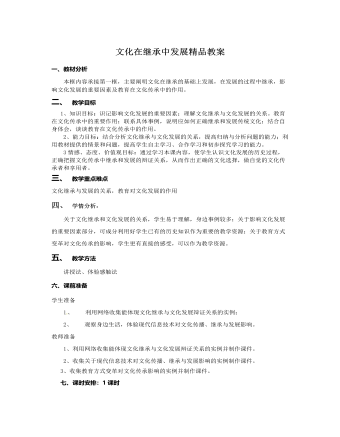
人教版高中政治必修3文化在继承中发展精品教案
二、 教学目标1、知识目标:识记影响文化发展的重要因素;理解文化继承与文化发展的关系。教育在文化传承中的重要作用;联系具体事例,说明应如何正确继承和发展传统文化;结合自身体会,谈谈教育在文化传承中的作用。2、能力目标:结合分析文化继承与文化发展的关系,提高归纳与分析问题的能力;利用教材提供的情景和问题,提高学生自主学习、合作学习和初步探究学习的能力。3情感、态度、价值观目标:通过学习本课内容,使学生认识文化发展的历史过程,正确把握文化传承中继承和发展的辩证关系,从而作出正确的文化选择,做自觉的文化传承者和享用者。三、 教学重点难点文化继承与发展的关系,教育对文化发展的作用四、 学情分析:关于文化继承和文化发展的关系,学生易于理解,身边事例较多;关于影响文化发展的重要因素部分,可成分利用好学生已有的历史知识作为重要的教学资源;关于教育方式变革对文化传承的影响,学生更有直接的感受,可以作为教学资源。

人教版高中历史必修3文艺复兴和宗教改革教案
三、宗教改革:1、背景:(1)文艺复兴的影响。文艺复兴中,人文主义学者尽管对宗教保持较为温和的态度,但其以人为中心的思想极大地冲击了天主教的精神独裁,天主教的权威日益受到人们的怀疑。(2)天主教会对欧洲尤其是德意志的压榨。中世纪的天主教会对人民进行严密的精神统治,基督教信仰的核心是“原罪”和“灵魂救赎”,即人生下来就有罪,只有信仰上帝,跟随耶稣才能得救。就“灵魂救赎”而言,最初强调的是个人信仰的作用,后来,神学家们又加上了种种繁杂的宗教礼仪,而且必须得到神职人员的帮助,灵魂才能得救。在经济上,天主教会还是最大的封建主,占有大量的土地,并征收什一税,对各国人民大肆搜刮。罗马教廷每年从德意志搜刮的财富达30万古尔登(货币单位),相当于“神圣罗马帝国”皇帝每年税收额的20倍。德意志也成了被教会榨取最严重的地区,素有“教皇的乳牛”之称。
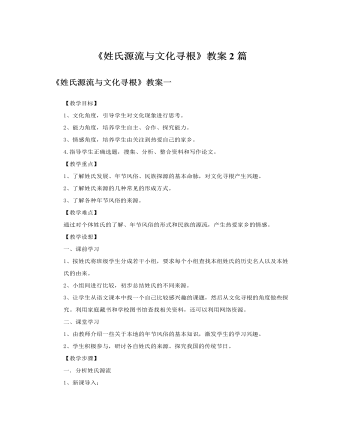
人教版高中语文必修2《姓氏源流与文化寻根》教案2篇
据此,研究者认为我国的姓源于原始社会母系氏族时期,并作为一个血缘家族的称号。氏隶属于姓。夏、商、周时期,姓氏作为贵族间区别不同血缘关系的一种制度。自秦汉以后,姓氏不分,合二而一。3、大家有没有听说过《水浒传》中一个人物“西门庆”,他姓西门,为什么姓西门呢?他家住在西门这个地方。大家想想东郭先生为何姓东郭?可见有按居住地而得姓。4、现在如果赋予同学们一个神圣的职责,让你们给一个人赐姓,这个人是杀猪杀鸡杀鸭的,你们觉得要给他一个什么样的姓才合适呢?(自由讨论,姓“屠”)明确:这就是姓氏来源的又一种方法,按照职业取姓。大家想一想有没有其他按照职业得姓的姓氏?(巫、卜、陶等)5、大家通过预习有没有发现其他获得姓氏的方法。(国名、自己祖先的字等。)姓在母系氏族社会以后,逐渐增多,来源极广。主要来源于封国名、谥号、爵位名、官名、居地、职业等。
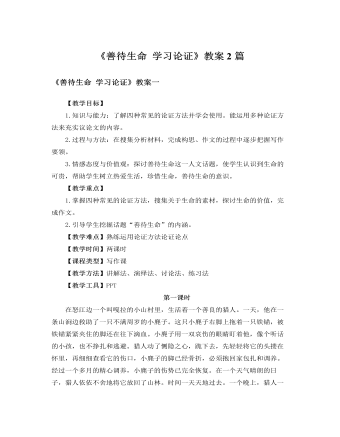
人教版高中语文必修3《善待生命 学习论证》教案2篇
论证方法之引证法如何用好引证法:1.所引用的名言警句等针对性要强。每句名言都产生于特定的背景,都应用于特定的交际目的,即使谈同一个问题,也有不少名言可供选取。2.要简洁,不宜过多。议论是在发表自己的见解而不是在介绍他人的见解。引用他人的话,目的是为了让读者更加信服自己的话。3.要注意直接引用和间接引用的区别。直接引用务求文字、甚至标点均准确无误;间接引用只须述其大意,但要注意人称的转换。论证方法之喻证法喻证法是用设喻来论证论点的方法。在议论文中,设喻可以使论点更易懂、更风趣、更容易获得读者的认同。喻证法能化抽象为具体、化艰深为浅显、化枯燥为生动。论证方法之喻证法如何用好喻证法:1.以小见大,就近取譬。要精选生活中细小的、人们熟悉的事物做为设喻的喻体。2.喻体不求形似,只求神似。做为喻证的喻体与做为比喻的喻体不同。比喻的喻体是为了强调特征,描绘事物,侧重形似,以形比形;而喻证的喻体是为了阐发观点,以正视听,力求神似,以义取形。
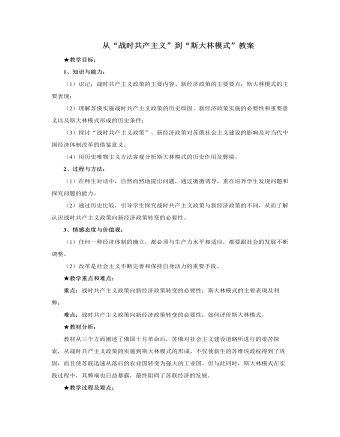
人教版高中历史必修2从“战时共产主义”到“斯大林模式”教案
5、弊端:(1)经济发展不均衡,片面发展重工业,使轻工业和农业长期处于落后状态;(2)对农民的剥夺太重,挫伤了农民的生产积极性;(3)长期执行指令性计划严重削弱了企业的生产自主权,不利于发挥企业的生产积极性,制约了苏联经济的可持续发展。(4)计划经济体制确立后,没有随着社会的变化进行调整,二战后逐渐僵化,丧失了自我完善的功能,成为苏联解体的重要因素。【合作探究】斯大林模式的评价及经验教训:积极:①使苏联迅速实现了 工业化②苏联经济实力的迅速增长,为反法西斯战争的胜利奠定了 物质基础 。消极:①政治:高度集权,破坏了 民主与法制 ; ②经济:优先发展重工业使 农业和轻工业长期处于落后状态,农民生产积极性不高;计划指令,压制了地方和企业的积极性,阻碍苏联经济的发展高度集中的计划经济体制,成为东欧剧变和苏联解体的重要原因。
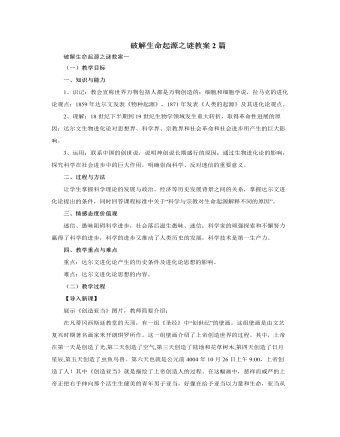
人教版高中历史必修3破解生命起源之谜教案2篇
设问:你怎么看待这个问题的?(这是达尔文没有想到的,是有人利用了达尔文的学说,科学应该与其区分开来,但是科学家在研究时,既要做到为追求真理不断探索,又要有一定的人文精神,比如我们只有以人为本,才能找到解决当今社会面临的诸如环保、战争、饥荒等问题的途径,才能构建防止核物理技术、克隆技术、信息技术、生物技术、太空技术等可能对人类造成不可逆转的破坏作用的思想基础、决策机制和社会条件。更重要的是社会和国家应该对此有足够的认识,正因为此,所以现在当一项科学发明出台后,就会有一些法律出台,限制其可能的非人道用途。但是这些影响应不成为我们进行科学探究的阻碍。)(3)科学与宗教的斗争设计意图:再次引导学生认识,科学的探索永无止境,同时也再次认识宗教和科学理论产生的原因。材料1:1972年,美国加利福尼亚教育部竟明文规定,中学生物学课本除进化论外,必须还有神创论的内容,而且两者的页数要各占一半。

人教版高中政治必修3加强思想道德建设教案
学生活动三:让学生阅读教材P108回答:(投影显示,然后让学生对这两个概念进行比较)总的说,法治与德治是相辅相成、相互促进的。设计意图:让学生弄清法治与德治的区别,并理解法治与德治的联系。教师过渡:(提问)我们进行思想道德建设的两个宝贵资源是什么?这又说明社会主义思想道德体系建设应与什么相承接?(3)社会主义思想道德体系应该与中华民族传统美德相承接①传统美德是中华传统道德中的精华学生活动四:列举中华民族的传统美德②今天倡导的基本道德规范是对中华民族传统美德的继承、发展和创新教师活动:(投影显示)我国《公民道德实施纲要》提出了20个字的基本道德规范。可以具体分为10个方面:爱国守法明礼诚信团结友善勤俭自强敬业奉献教师过渡:在我们的社会主义社会里,是非、善恶的界限绝对不能混淆,坚持什么、反对什么,倡导什么、抵制什么,都必须旗帜鲜明。所以我们必须树立社会主义荣辱观。(4)树立社会主义荣辱观——八荣八耻
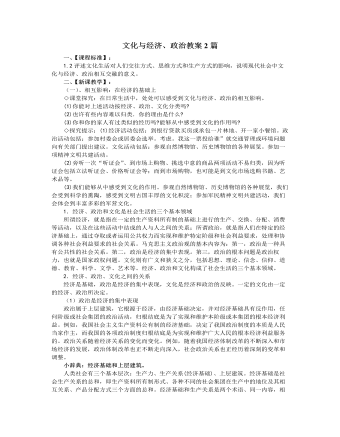
人教版高中政治必修3文化与经济、政治教案2篇
1.在激烈的国际竞争中,美国为首“巴统”在对中国出口高科技产品的问题上采取了种种限制措施,以避免西方发达国家的高科技技术和设备流人中国。面对发达国家的技术封锁,我们应该( )A.加速我国对外开放的步伐B.尽快改善与西方发达国家的关系C.努力提高自身的科技水平,增强本国的综合国力D.立足于自力更生,努力开发所有的高科技技术,以免受制于人答案:C解析:在当今和未来的世界,经济是基础,科技是龙头。因而,发展经济和科学技术是世界大多数国家最关心的问题。各国之间的竞争越来越多地转向经济和科技领域。各国都已经清楚地认识到,能否在科技发展上取得优势,增强以经;济和科技为基础的综合国力,最终将决定本国在国际上的地位。受各种主客观条件的限制,任何国家都不可能开发出自己所需要的所有技术,国家之间必须加强技术交流,互通有无,共同发展。“巴统”对我国进行技术出口方面的限制是基于其敌视中国的战略需要。为了打破西方国家的对我国的技术限制,我国必须从自身出发,提高自身的科技水平。
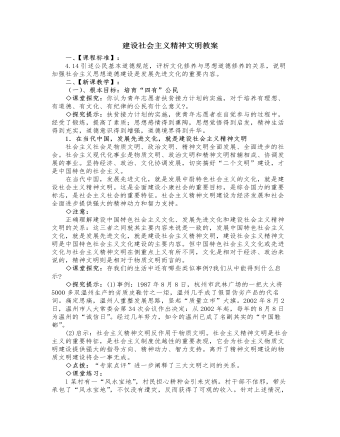
人教版高中政治必修3建设社会主义精神文明教案
(2)伟大的意义:这些精神文明创建活动,是人民群众“移风易俗”、改造社会的伟大创造,也是人民群众自我教育、自我提高的有效途径。各具特色的精神文明创建活动,使人们在自觉参与的过程中思想感情得到熏陶,思想觉悟得到启发,精神生活得到充实,道德意识得到增强,道德境界得到升华。这对整个中华民族的精神面貌,正在产生不可估量的积极影响。◇点拨:“相关链接”描述了青年志愿者活动,引导学生感悟其精神,升华道德境界,增强参与意识。(3)必然的选择:投身于社会主义精神文明建设的伟大实践,做新时期中国先进文化的传播者和建设者,是当代中国青年成长、成才的必然选择。◇拓展延伸:在群众性精神文明创建活动中涌现出的先进人物和英雄模范,像孔繁森、张海迪、徐洪刚、韩素云、李国安、徐虎、李素丽等,在全社会起到了良好的示范作用;提出的一些响亮口号,如“从我做起,从现在做起”“岗位学雷锋,行业树新风”“单位做个好职工,社会做个好公民,家庭做个好成员”等,不断激励着人们。
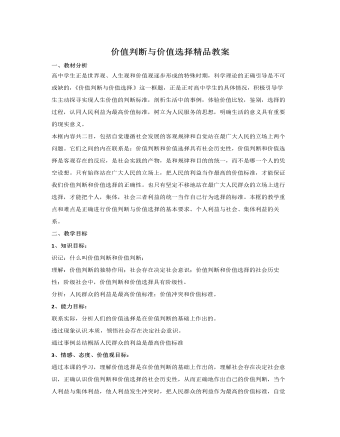
人教版高中政治必修4价值判断与价值选择精品教案
南极大地的水陆交接处,全是滑溜溜的冰层或者尖锐的冰棱。企鹅没有可以用来攀爬的前臂,也没有可以飞翔的翅膀,如何从水中上岸?纪录片《深蓝》展示,企鹅在将要上岸之时,要从海面潜入海中,沉潜到适当的深度,借用水的浮力,迅猛向上,飞出一道弧线,落于陆地之上。企鹅的沉潜是为了蓄势,看似笨拙,却富有成效。人生又何尝不是如此?沉潜绝非沉沦,而是勇敢、智慧、自强。如果我们在困难面前能沉下气来,不被“冰棱”吓倒,不被浮华迷惑,专心致志,自强不息,积聚力量,并抓住恰当的机会反弹向上,毫无疑问,我们就能成功登陆!反之,总是随波浮沉,或者怨天尤人,注定就会被命运的风浪所玩弄,直至精疲力竭。结合上述材料,运用《生活与哲学》知识对“价值观是人生的重要向导,有价值观的人生才是更美的人生”加以评析。7、有两名畜牧兽医专业毕业的大学生应聘到农村养猪场担任技术总监后,大力推广使用生态养猪法和中草药防疫技术,使养猪场步入了良性发展轨道。

新人教版高中英语必修3Unit 2 Morals and Virtues-Discovering Useful Structure教学设计
1. 表示时间。Hearing these stories, I’m skeptical about the place. = When I heard these stories. . . 2. 表示原因。Not knowing his address, I can’t send this book to him. = Because/Since/As I don’t know his address. . . 3. 表示结果。His father died, leaving him a lot of money. =. . . and left him a lot of money4. 表示条件。Going straight down the road, you will find the department store. = If you go straight down the road. . . 5. 表示让步。Being tired, they went on working. =Although they were tired. . . 6. 表示行为方式、伴随情况或补充说明。He lay on the grass, staring at the sky for a long time. =. . . and stared at the sky for a long time注意:非谓语动词作状语时, 如所提供的动词不能和句子中的主语保持一致, 动词-ing形式必须有自己的逻辑主语, 通常由名词或代词来担任, 这就是独立主格结构。The last bus having gone, we had to walk home. (having gone的逻辑主语是the last bus, 而不是we)Weather permitting, the football match will be played on Friday. (permitting的逻辑主语是time, 而不是the football match)Step 7 Practice1. ________(study) hard, you are sure to get first prize. 2. People use plastic in their daily life, _______(leave) large amounts of waste. 3. ________(work) hard at your lessons, you are to succeed. 4. The old man, ____________(work) abroad for twenty years, is on the way back to his motherland. 5. ______________(finish) his homework, he was playing on the playground. Answers: 1. Studying 2. leaving 3. Working 4.having worked 5. Having finishedStep 8 HomeworkFinish the homework on Page 22.

新人教版高中英语必修3Unit 2 Morals and Virtues-Reading and Thinking教学设计
The topic of this part is “Learn to make choices in life”.The Listening & Speaking & Talking part aims at the moral dilemmas, and this part is about making choices in life. The heroin is Lin Qiaozhi, a famous medical scientist, made a great contribution to our country’s medical care. Most importantly, her life experience can inspire our students whether in studying or the development of career. she had moral dilemmas and life choices, which are similar to the students who will step into society. Besides, Lin has quite good virtues like kindness, self-improvement, insistence, job-loving , generosity and responsibility, which is worth being learned.Concretely, this article is a biography about Lin Qiaozhi. The article tells her whole life according the timeline, among which the life choices is emphasized. For example, whether married or chased her dream, returned home or stayed abroad, family or public, her choices all reflected her faith, spirit, responsibility and devotion.1. Fast reading to get the detailed information about Lin Qiaozhi; careful reading to do the deductive information.2. Learn the reading skills--deductive judgement according the context.3. Study the structure features and language features. 4. Communicate about Lin’s life choices and reflect their own life choices.1. Learn the reading skills--deductive judgement according the context.2. Study the structure features and language features.3. Communicate about Lin’s life choices and reflect their own life choices.Step 1 Lead in---Small talkWhat are some important life choices?Importance choices: university study, jobs and marriage partners. Because they can determine our future.

新人教版高中英语必修3Unit 3 Diverse Cultures-Listening &Speaking&Talking教学设计
1. In Picture 1 and Picture 2, where do you think they are from? How do you know?From their wearings, we can know they are from ethnic minority of China--- Miao and Dong.Picture 1, they are playing their traditional instrument lusheng in their traditional costumes.Picture 2. the girls are Miao because they wear their traditional costumes and silver accessory.2. In Picture 3, can you find which village it is? What time is it in the picture?It is Dong village. It is at night. Step 2 While-listeningJustin met a new friend while traveling in Guizhou. Listen to their conversation and complete the summaries below.Part 1Justin and Wu Yue watched some Miao people play the lusheng. The instrument has a history of over 3,000 years and it is even mentioned in the oldest collection of Chinese poetry. Then they watched the lusheng dance. Justin wanted to buy some hand-made silver/traditional accessories as souvenirs. He was told that the price will depend on the percentage of silver. Part 2They will go to a pretty Dong minority village called Zhaoxing. they will see the drum towers and the wind and rain bridges. They may also see a performance of the Grand Song of the Dong people.Step 3 Post-listening---TalkingWork in groups. Imagine Justin is telling some friends about his trip to Guizhou. One of you is Justin and the rest of you are his friends. Ask Justin questions about his trip and experience. The following expressions may help you.

新人教版高中英语必修3Unit 4 Space Exploration-Discovering Useful Structure教学设计
The theme of the section is “Describe space facts and efforts to explore space”. Infinitives are one of non-finite verbs, as the subjects, objects, predicative, attributes and adverbials. This unit is about space exploration, which is a significant scientific activity, so every scientific activity has strong planning. Therefore, using the infinitives to show its purpose, explanations or restrictions is the best choice.1. Learn the structure, functions and features of infinitives.2. Learn to summarize some rules about infinitives to show purpose and modify.3. Learn to use infinitives in oral and writing English. 1. Learn the structure, functions and features of infinitives.2. Learn to summarize some rules about infinitives to show purpose and modify.3. Learn to use use infinitives in oral and writing English.Step 1 Lead in---Pair workLook at the following sentences and focus on the italicized infinitives. In pairs, discuss their functions. 1. I trained for a long time to fly airplanes as a fighter pilot..(作目的状语)2. As we all know, an astronaut needs to be healthy and calm in order to work in space..(作目的状语)3. First of all, you must be intelligent enough to get a related college degree..(作目的状语)4. Some scientist were determined to help humans realise their dream to explore space..(作定语)5. On 12 April 1961, Yuri Gagarin became the first person in the world to go into space..(作定语)Summary:1. 不定式的结构:to+do原形。2. 分析上面的句子,我们知道在描述太空探索时,动词不定式不仅可以用来表目的,还可以用来作定语,表修饰。

新人教版高中英语必修3Unit 4 Space Exploration-Reading and Thinking教学设计二
The theme of this unit focuses on “space exploration.” Students will learn about the training and experience needed to become an astronaut. The text is mainly about the development of space exploration. On the one hand, the text helps students to have a good understanding about the great feats humans have achieved, on the other hand, they will further understand the contributions that we Chinese have achieved, and feel confident and proud about our homeland and strengthen their love for our country. The teacher should instruct students to aim high and study harder to make great progress in the space career if possible.1. Read about the development and value of space exploration.2. Explore the mysteries of the universe and the achievements in space exploration.3. Skillfully use the vocabulary of this text to cultivate self-study ability 4. Develop cooperative learning ability through discussion.1. Enable the Ss to talk about the development and value of space exploration.2. Guide the Ss to summarize the main idea of each paragraph as well as the main idea of the text.3. Help Ss comprehend the main reasons for space exploration. Multi-media, textbook, notebooks.Step 1: Warming up and predictionLook at the title and the pictures of the text and predict what the text will be about?2. What are the main reasons for space exploration?

新人教版高中英语必修3Unit 5 The value of money-Reading and Thinking教学设计二
? Could you offer me some kind of work here?? I don’t want your charity, I just want an honest job.? Careless: I landed in Britain by accident.Step 7:Consolidation.? Find Henry? Roderick and Oliver were I .making a bet when they saw Henry, a poor young man. ? Know Henry? About a month ago, Henry was sailing and later he found himself carried out to sea by a strong wind. Fortunately, he 2.was spotted by a ship. And it was the ship that brought him to 3.England? Offer money to Henry ? Oliver and Roderick gave Henry a letter and told him that there was money in it. They 4.persuaded him to accept it, and made him 5.promise that it wouldn't be opened until 2 o'clock.Step 8:Language pointsa large amount of: a large quantity of; a great deal ofe.g. They bought a large amount of furniture before they moved their new house.make a bet: make an arrangement to risk money, etc. on an event of which the result is doubtful.e.g. We made a bet on the result of the match.permit sb to do something: allow somebody to do somethinge.g. My mother doesn’t permit me to ride in the street after it rained.by accident: as a result of chancee.g. I only found it by accident.stare at: look at somebody or something with the eyes wide open in a fixed gaze( in astonishment, wonder, fear, etc)to be honest: to tell you the truth; to be franke.g. To be honest, I don’t think we have a chance of winning.Step7 Homework:What do you think will happen to Henry? Will the bank-note help him or get him into trouble?
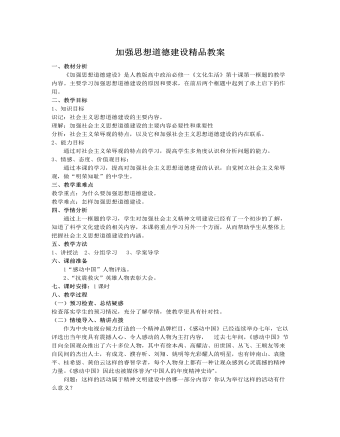
人教版高中政治必修3加强思想道德建设精品教案
一、教材分析《加强思想道德建设》是人教版高中政治必修一《文化生活》第十课第一框题的教学内容。主要学习加强思想道德建设的原因和要求,在前后两个框题中起到了承上启下的作用。二、教学目标1、知识目标识记:社会主义思想道德建设的主要内容。理解:加强社会主义思想道德建设的主要内容必要性和重要性分析:社会主义荣辱观的特点,以及它和加强社会主义思想道德建设的内在联系。 2、能力目标通过对社会主义荣辱观的特点的学习,提高学生多角度认识和分析问题的能力。3、情感、态度、价值观目标:通过本课的学习,提高对加强社会主义思想道德建设的认识,自觉树立社会主义荣辱观,做“明荣知耻”的中学生。三、教学重难点教学重点:为什么要加强思想道德建设。教学难点:怎样加强思想道德建设。
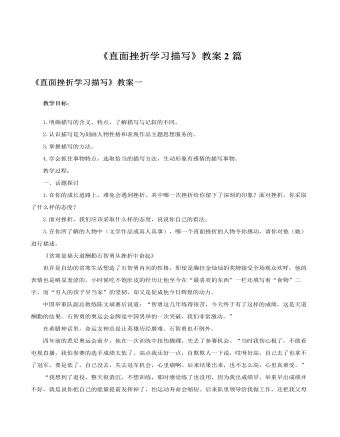
人教版高中语文必修2《直面挫折学习描写》教案2篇
《贫寒是福天道酬勤石智勇从挫折中奋起》也许是自幼的贫寒生活塑造了石智勇内向的性格,即使是胸挂金灿灿的奖牌接受全场观众欢呼,他的表情也是略显羞涩的。小时候吃不饱肚皮的经历让他至今在“最喜欢的东西”一栏还填写着“食物”二字,而“穷人的孩子早当家”的坚韧,却又是促成他今日辉煌的动力。中国举重队副总教练陈文斌赛后说道:“智勇这几年练得很苦,今天终于有了这样的成绩,这是天道酬勤的结果。石智勇的奥运会金牌是中国男举的一次突破,我们非常激动。”在希腊神话里,命运女神总是让英雄历经磨难。石智勇也不例外。四年前的悉尼奥运会前夕,他在一次训练中扭伤脚踝,失去了参赛机会。“当时我伤心极了,不敢看电视直播,我怕参赛的选手成绩太低了。高点我还好一点,自欺欺人一下说,哎呀好高,自己去了也拿不了冠军,要是低了,自己没去,失去冠军机会,心里痛啊。后来结果出来,也不怎么高,心里真难受。”
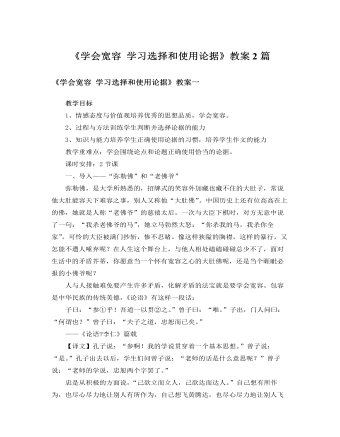
人教版高中语文必修3《学会宽容 学习选择和使用论据》教案2篇
评价分析法,就是引述事例后,对所引述的事例作适当的评价,从而使自己的观点得到印证。例如,在论“节俭”时,引用了“曾国藩以俭戒子,其子曾纪泽终成出色的外交家;方志敏居官不贪,一生清贫,千古留名”的事实后,接着进行分析:是的,“俭者心常富”,节俭能培养人同困难作斗争的勇气和意志,而这正是一个人立业最重要的素质。从这个意义上说,有人说饥饿是人生的佐料,吃苦是一种资本也不无道理,而自觉和戒奢尚俭则更是促人修身养性,磨炼意志的有效途径。这里,作者紧扣论点,对论据进行了评价性分析,这种评价分析使作者的观点得到强化。(四)因果分析法因果分析法,就是抓住论据所述的事实,并据此推求形成原因的一种分析方法。事出必有其因。我们可以依据事物发展变化的因果关系,由事物发展变化的结果,推导出产生这种结果的原因,从而揭示出一定的生活规律,使事例有力地证明观点。

